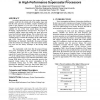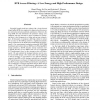10 search results - page 1 / 2 » An efficient wakeup design for energy reduction in high-perf... |
CF
2005
ACM
13 years 6 months ago
2005
ACM
In modern superscalar processors, the complex instruction scheduler could form the critical path of the pipeline stages and limit the clock cycle time. In addition, complex schedu...
ICCD
2005
IEEE
14 years 1 months ago
2005
IEEE
The dynamic instruction scheduling logic is one of the most critical components of modern superscalar microprocessors, both from the delay and power dissipation standpoints. The d...
ISVLSI
2008
IEEE
13 years 11 months ago
2008
IEEE
Powerful branch predictors along with a large branch target buffer (BTB) are employed in superscalar processors for instruction-level parallelism exploitation. However, the large ...
PACS
2000
Springer
13 years 8 months ago
2000
Springer
Increasing power dissipation has become a major constraint for future performance gains in the design of microprocessors. In this paper, we present the circuit design of an issue ...
CF
2007
ACM
2007
ACM
Adaptive VP decay: making value predictors leakage-efficient designs for high performance processors
13 years 8 months ago
Energy-efficient microprocessor designs are one of the major concerns in both high performance and embedded processor domains. Furthermore, as process technology advances toward d...


